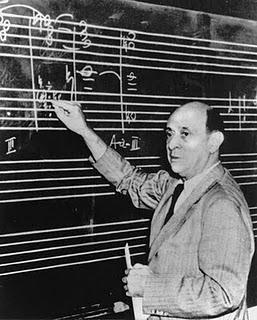"What an amazing score! An orchestra of five musicians. Sounds appeared, which never were heard before. Sometimes it sounded like an orchestra of 100." --Otto Klemperer on Pierrot Lunaire
"So sure was Schoenberg's touch in his incubus of a clown that it is as if the Pierrot into whom he breathed life has gone on to shape his own history, to frighten us into believing that he emerged from nowhere, has no ancestors, no attachments and, most provocatively, cannot die." -Jonathan Dunsby, Schoenberg: Pierrot Lunaire

Via Entartete Musik
It turns out that Schoenberg's music itself is far less intimidating to me than musicologists who write about it. I got myself a whole stack of books out of the library, and kept finding alarming utterances along the lines of "Indeed, this can seem thorny and impenetrable..." (Yes, the Really Shameful Confession here is that the only Schoenberg works I'd previously heard live were his first chamber symphony, some cabaret songs, and Pelleas und Melisande... nothing thorny and impenetrable.) So I looked at Schoenberg and his World, and Inside Pierrot Lunaire, and listened to the Sinopoli recording, and headed off to hear it on Saturday with great excitement, but also a certain amount of fear and trembling. Thanks to Operamission, I had a great time soaking it all in, along with a fierce rendition of Stravinsky's L'Histoire du Soldat, and the rest of the audience in the space at the Gershwin Hotel seemed to as well. [Update: video of the performance is available here.]Through all the surreal twists and turns of Pierrot Lunaire, the ensemble under the leadership of Jennifer Peterson (full list in program here) provided excellent atmosphere. Mezzo-soprano Jennifer Berkebile gave an interpretation of the Sprechstimme which was closer to song than speech, or at least closer than I had expected. Both her diction and expression were admirable, and much appreciated by me. (The cycle was sung in German, with narrators giving the English text in the pauses between songs. I would have preferred to do without this, but it was well-integrated into the performance, and perhaps preferable to having the audience with their noses buried in a "texts and translations.") The mercurial moods of the melodramas were precisely charted, from the sensual intoxication of "Mondestrunken" to ironic distance for the "Colombine" waltz." The players brought whirling romanticism to the "Valse de Chopin," savagery to "Madonna." Berkebile employed interesting vocal effects in "Der kranke Mond," with excellent word painting. After increasingly claustrophobic and feverish desperation in the middle section, it was almost disorienting to be lulled by the repetitive patterns of "Serenade," the ripples on the water of pizzicato strings in "Heimfahrt." The "alter Duft aus Märchenzeit" died gradually into an eerie stillness.
After the interval, we returned for another dose of early twentieth-century modernism in the form of Stravinsky's L'Histoire du Soldat, performed in English translation. It was not staged, but the speakers were dynamic in movement, as well as vocal expression. Ryan Allen's Devil, especially, was notable for the relish of his characterization, which was in turn relished by the audience. The musicians played with rich sound, and crisp treatment of tempo and dynamics. The performance was evocative and engaging, with plaintive mourning of winds and pizzicato strings for the soldier's first disappointment, deliberately (and perhaps ironically) nostalgic folksiness of peasant fiddling, and "regal" music that reverberated with giddy caricature. Careening from gypsy music to jazz to "Ein feste Burg," the ensemble guided the audience through Stravinsky's sound world with a sure hand. After much applause, Peterson joked that we didn't seem to want to leave... and it was true; but eventually we did, invigorated by our contact with two of modern music's masters.

